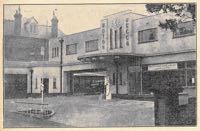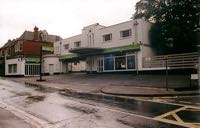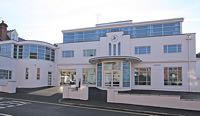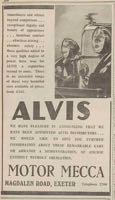
Zenith House
Formerly Motor Mecca, Barton Motor Company and Kastners Garage.
Page updated 30th September 2015
Return to Retail Exeter
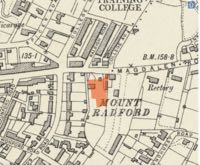 The art-deco former garage known as Zenith House in Magdalen Road is best remembered as the Volvo agent, Kastners. The building was constructed for Albert H Warren in 1933, when he was trading as Warren Bros. Warren wanted a garage that was technically, for the time, far ahead of his rivals, offering space for thirty cars in its workshops, and ten private lock-ups for the increasing number of private cars on the road.
The art-deco former garage known as Zenith House in Magdalen Road is best remembered as the Volvo agent, Kastners. The building was constructed for Albert H Warren in 1933, when he was trading as Warren Bros. Warren wanted a garage that was technically, for the time, far ahead of his rivals, offering space for thirty cars in its workshops, and ten private lock-ups for the increasing number of private cars on the road.
The new building was not only to be in an art-deco style, but it was to be an ‘all electric’ building, and innovation for a garage at the time. The architects, R. M. Challice and Son of Bedford Circus, produced a design that added to an existing garage. Messrs., N Pratt and Sons of Clyst St Mary were contracted to construct the building.
The building constructed with, the then new, cavity wall construction was set back from the road to allow the placing of petrol pumps at the front. A suspended cantilevered roof protruded, creating an entrance cover from the elements; a clock was placed centrally above the porch. It is said, that the original design was conceived so that if the building ceased to be a garage, it could be converted into flats. When it opened it was known as Motor Mecca, under the management of Albert H Warren, the son of Albert J Warren, who sponsored the garage as Warren Bros. Warren Bros., had for many years been furniture dealers and estate agents in Queen Street and Magdalen Road.
An article in the Exeter and Plymouth Gazette in January 1934 waxed lyrical about the “garage run by electricity” and the “all automatic automobile service station”. At the front was a showroom large enough to take two vehicles; Mecca were agents for Vauxhall and Ford vehicles. The main innovation was the use of electricity to power the garage. An electrically powered compressor supplied air lines at 150lb pressure around the building. It could power a grease gun and inflate two tyres at a time. Water could be pumped at 350lbs to spray and clean cars. Another pump also supplied from two 300 gallon tanks, six mixes of petrol to the pump in front of the garage. A hydraulic lift with an inspection pit was also incorporated into the workshop. The article went on.
“Mr. Warren, senr., told our representative that there would be no extra cost to motorists, for the equipment facilitates the work and that the charges, if anything, would be cheaper. Every precaution has been taken in the event of fire, and, in addition to the usual equipment in accordance with the regulations, the building is constructed with fire resisting material. The roof, for example, is of asbestos and has a guaranteed “life” of fifty years. All switch plugs on the electrical system are of the inter-locking type, and every piece of electrical apparatus is "earthed.””
A clock on the manager’s office was synchronised to the clock at the front, and one in the workshop. The mechanics had the use of a spark plug cleaner and tester, along with a gravity fed oil distribution system. For the time, the garage was the most modern in Exeter.
In March 1937 the garage became an Alvis Dealer, an upmarket vehicle that was out of the price range of many motorists. By 1939 Warren Bros., were placing small ads for used cars and offering end of season prices for the Alvis range, at the start of the Second War. The adverts offered delivery vans during 1940. In the 1960s, the garage was occupied by the Barton Motor Company.
Kastners
Noel Kastner had been living abroad when he decided to purchase a Ford garage from a Mr Sammy Tremaine in Honiton, in 1961. Kastner's two son-in-laws joined the business as Sales Manager and the Bodyshop Manager. The business flourished and in 1970, the decision was made to become a Volvo dealership, under the name, Kastner Volvo.
In 1975, the existing Exeter Volvo dealership based at the Bedford Street Garage became vacant and Kastner took it over at a new location in Magdalen Road, closing down the Honiton premises after 14 years. The new premises soon became the centre for all Volvo owners to take their cars. The business flourished, but eventually Noel Kastner decided to sell up and emigrate to Australia. An investment company took over the business and new showrooms were opened in Plymouth, Chippenham, Bristol and Bracknell. In 1983 petrol sales from the Magdalen Road forecourt were discontinued to allow the expansion of sales and service. In 1992, there was a management buyout and the Exeter business moved to a new, purpose built premises at Matford Park. Although the Magdalen Road garage was sold for redevelopment, to date the premises remain - a rather fine example of 1930's architecture.
During 2005 to 2007, the garage was refurbished into residential accommodation. The developer is to be congratulated on a sensitive and appropriate conversion, which retains many of the features of the original building. If only more developers could be this innovative, rather than just destructive.
Source: Various sources including the Exeter and Plymouth Gazette from the British Newspaper Archive.
│ Top of Page │
